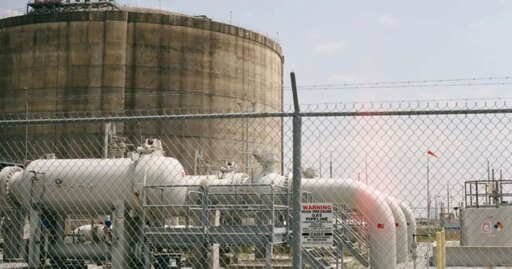In Louisiana, natural gas—a planet-heating fossil fuel—is now, by law, considered “green energy” that can compete with solar and wind projects for clean energy funding. The law, signed by Republican Governor Jeff Landry last month, comes on the heels of similar bills passed in Ohio, Tennessee, and Indiana. What the bills have in common—besides an “updated definition” of a fossil fuel as a clean energy source—is language seemingly plucked straight from a right-wing think tank backed by oil and gas billionaire and activist Charles Koch.
Louisiana’s law was based on a template created by the American Legislative Exchange Council (ALEC), a conservative organization that brings legislators and corporate lobbyists together to draft bills “dedicated to the principles of limited government, free markets and federalism.” The law maintains that Louisiana, in order to minimize its reliance on “foreign adversary nations” for energy, must ensure that natural gas and nuclear power are eligible for “all state programs that fund ‘green energy’ or ‘clean energy’ initiatives.”
Louisiana state Rep. Jacob Landry first introduced a near-identical bill to the model posted on ALEC’s website and to the other bills that have passed in Ohio, Tennessee, and Indiana. (The Washington Post reported in 2023 that ALEC was involved in Ohio’s bill; ALEC denies involvement.) Landry, who represents a small district in the southern part of the state, is the recipient of significant fossil fuel-industry funding—and he co-owns two oil and gas consulting firms himself. During his campaign for the state Legislature, Landry received donations from at least 15 fossil-fuel-affiliated companies and PACs, including ExxonMobil (which has also funded ALEC) and Phillips 66. Those donations alone totaled over $20,000.



Ethanol burns like crap, produces the same or more emissions than gasoline, and generally is a terrible fuel.
The reason we started making E85 was because there was concerns about not having enough gasoline production in the states. Then we discovered fracking, and we started to “drill baby drill”.
Electric or Plug In Hybrids are a much better option. You can produce the fuel entirely with solar, wind, nuclear, etc. if you put your mind to it, they’re much more efficient, and even accounting for the battery production emissions, they surpass greenhouse gas emissions within a few years of ownership.
Electric batteries are expensive and hard to fix, yes. This needs to be worked on. However, the cost of ownership is much lower, so you aren’t “bleeding out” costs over time like an ICE. It’s just a big “wham” for a batt replacement.
Also, an electric battery doesn’t typically just go completely dead all at once. It loses 10-30% of it’s capacity after the first 8-10 years. That means if you had 200 miles of range, now you have 140-180 miles of range. Unless the battery has a fault or the electrical system completely fails, this is fine. Most people drive less than 50 miles round trip for a commute. Even at double that, you still have 1/3 of your batt left.
If you’re a two car family, IMHO, one fully electric and one plug-in hybrid is the way to go.
If you’re a one car family who takes lots of road trips, plug-in hybrid. If not, all electric.
Also, it can be made from all-American corn, the most American of crops.
You might not be able to run cars on corn syrup, but you can run them on this.
Probably could run your diesel in vegetable oil made from corn, but yeah…LOL